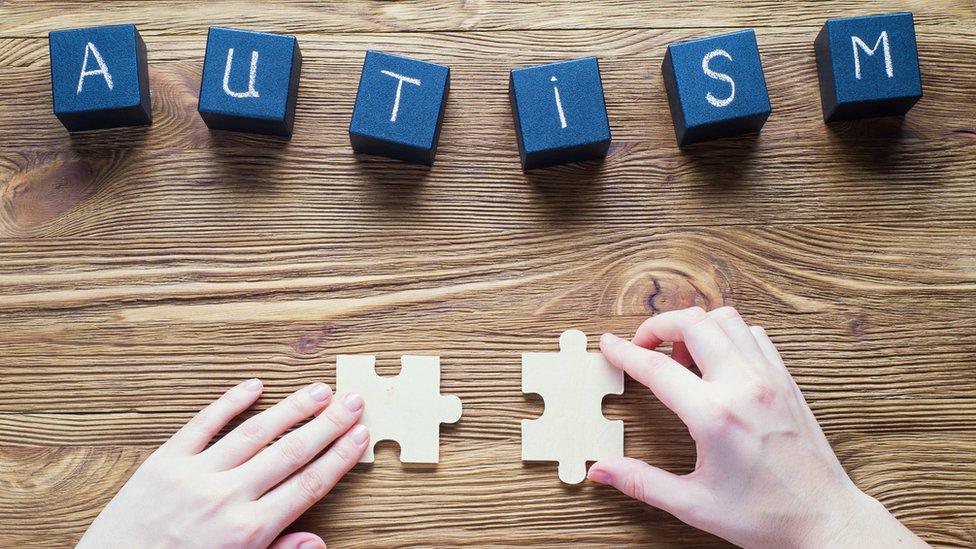Autism: 'They said bleach would cure my daughter'
- Published
Yvonne and Jasmine have "come a long way" but it's been tough, Yvonne says
"I've had people offer me products to 'kill the autism' - bleach, salts, supplements."
For Yvonne Odukwe, a Nigerian living in Newport, community stigma around her daughter's autism is a barrier - but it's only half of a "double whammy".
She and others say black, Asian and minority ethnic (BAME) people can also face poor engagement from authorities.
The Welsh Government said its national autism team "regularly engages with BAME communities" among other steps.
"It's a double layer," said Yvonne, mother of 19-year-old Jasmine.
"I'm fighting the mainstream and then I'm also fighting my community because they're not accepting me and, in many cases, blaming and shaming me."
Autism is a lifelong development disability which affects how people see, hear and interact with the world.
Yvonne, a mother-of-three, said that like many parents of autistic children, she'd had to fight to get Jasmine support, but many parents from backgrounds like hers must also overcome a code of secrecy in the community.
"There's that fear and unease - something we don't know, we don't accept," she said.
"So because of that, there's the stigma. You don't talk about autism, it's kind of like a shame to even admit that you have a child with autism."
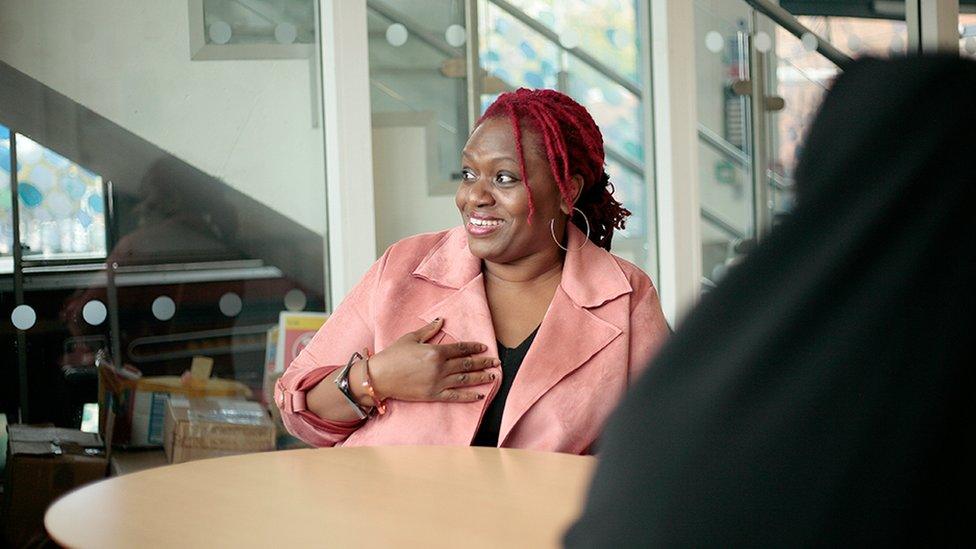
Yvonne Oduke has set up a Facebook group and podcast to help other parents in her position
Yvonne said she had heard stories in relation to different Asian and African communities where autism was attributed to witchcraft, curses or bad parenting.
"I had a friend who had a son with autism and she was asked to bring the boy home so that they can do an exorcism," she said.
"It's not seen as a condition, it's more like someone's done something to you or you've done something wrong."
After receiving requests for help and advice from other BAME parents, Yvonne set up a Facebook support group and podcast to signpost, refer and "hand-hold", though for many people the barriers prove too much to overcome.
"We are coming from communities where there's a blame game," she said.
"So, for some of us that want to get the services, we have to maybe hide. You want the services but you don't want to shout it from the rooftops.
"Now, when I go out to get the services, I look around - I'm the only person of colour in the room. It takes someone with courage to want to sit it out and some people at the door, they go back."
She said if you "flip the coin", she had also spoken to service-providers, agencies and charities that struggled to attract families from some BAME communities to outreach events, with no clue why.
"There's a big disconnect between the people that want to give the services and the families that want to receive it," she said.
The National Autistic Society says its research suggests it can be harder for people from BAME backgrounds to get a diagnosis and support., external
School census figures show that in Wales' mainstream schools only 8.4% of pupils aged five and over who are diagnosed with autism spectrum disorder (ASD) are from BAME communities, whereas 11.8% of all pupils identify as BAME.
However, the rate is higher in special schools, where only 10.6% of all pupils identify as BAME and yet 11.8% of pupils diagnosed with ASD come from those communities.
Dr Chris Papadopoulos, a public health lecturer at the University of Bedfordshire who has done research into the stigma of autism, said there was "emerging evidence" BAME people faced longer waits for diagnoses and support than white populations.
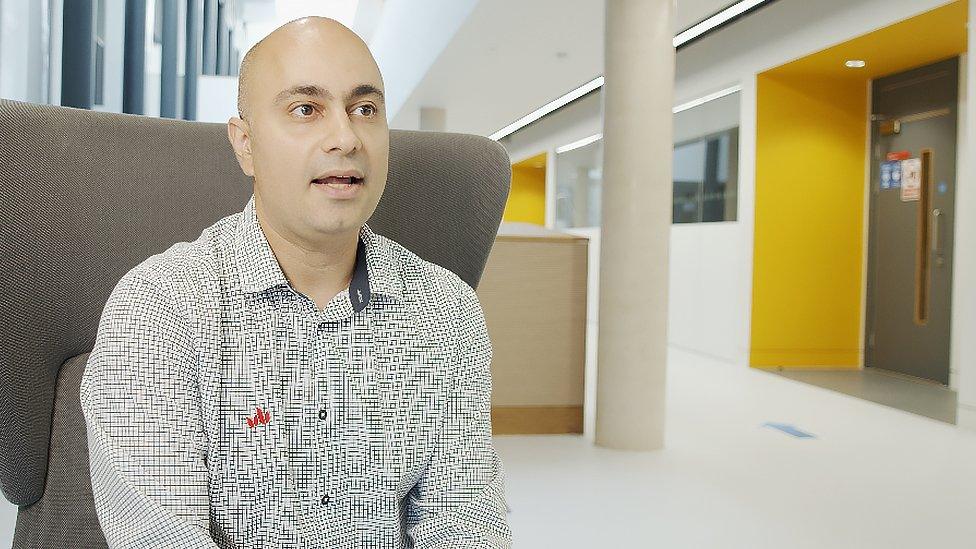
Dr Chris Papadopoulos said there can be mistrust between some communities and the authorities
"Firstly, the services aren't particularly culturally competent," he said.
"Often, they misunderstand how to communicate with these particular ethnic minorities and therefore, as a result, these communities often don't trust the services and don't want to access them."
On the other hand, he said, there was often a problem with knowledge among some groups.
"They don't necessarily understand autism very well, they may not identify it among their children at an early age and therefore they attempt to access support only at a late stage, so they might have missed the boat."
Dr Papadopoulos said there was evidence some communities' perceptions of autism helped foster stigma, secrecy and isolation.
Campaigner Hazel Lim, whose son is autistic, said some people in the Chinese community think autism is a "contagious disease"
"Some are more likely to see autism as a result of a past sin in a past life and that therefore needs purging or curing, and other communities see it as something that should be feared and perhaps associated with danger; and other communities are a little bit ahead of the game and view it a bit more as a difference as opposed to a problem," he added.
Dr Papadopoulos said he had heard examples of autistic children being subjected to "very dangerous treatments".
"You cannot cure autism," he said. "You should not attempt to cure autism. Autism is simply a difference that doesn't need healing."
Race Council Cymru has previously said grass-roots, ethnic minority organisations need to be encouraged to talk about autism more to remove stigma.
But Dr Papadopoulos said the onus was on public authorities to engage with community leaders and religious figures who have "problematic" views of autism.
"Services need to access these communities by showing that they can understand the cultural values of those particular communities, but they can actually implement a supportive, compassionate, good service as well," he added.
The Welsh Government said: "Our National Autism Team regularly engages with BAME communities in Wales and promotes educational resources about autism and BAME.
"Local neuro developmental teams work directly with families of children with autism and a scheme has been developed in Cardiff specifically for families who do not speak English as a first language.
"We also fund a cultural competence accreditation scheme which is open to all health organisations in Wales.
"The National Autism Team does not offer autism diagnostic assessments, however the seven integrated autism services in Wales provide adult autism diagnostic assessment (sometimes jointly with other services), support and advice for autistic adults, parents/ carers, and professionals."
Related topics
- Published18 July 2018
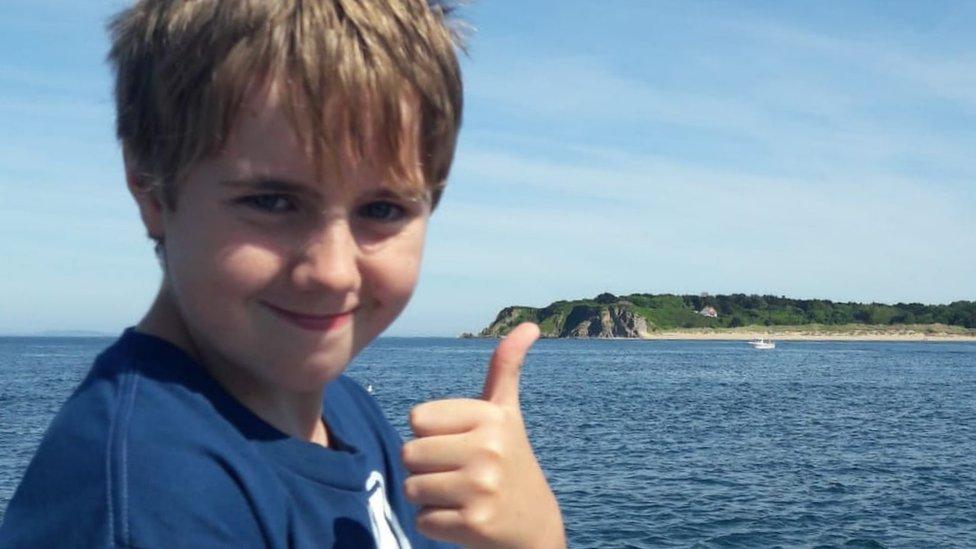
- Published11 October 2020
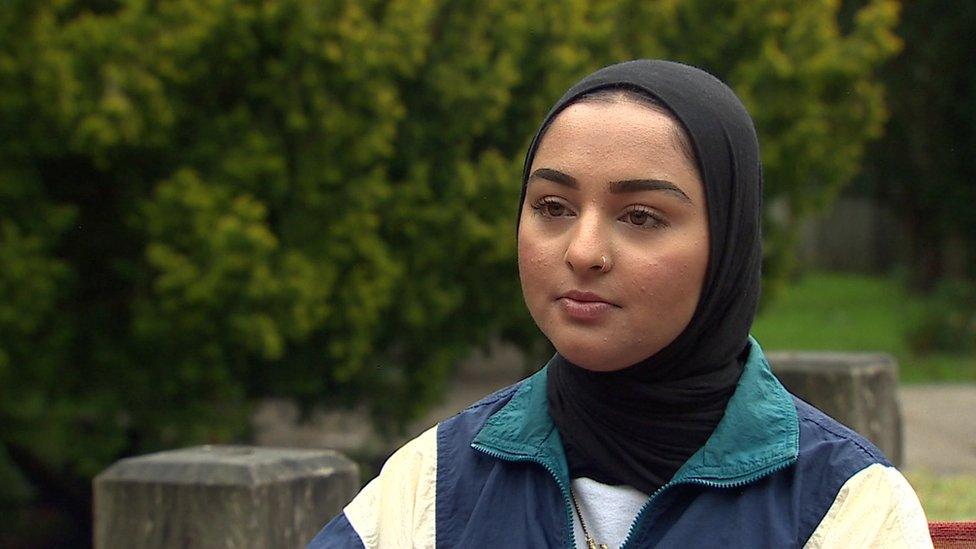
- Published16 August 2018
